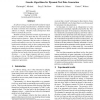Free Online Productivity Tools
i2Speak
i2Symbol
i2OCR
iTex2Img
iWeb2Print
iWeb2Shot
i2Type
iPdf2Split
iPdf2Merge
i2Bopomofo
i2Arabic
i2Style
i2Image
i2PDF
iLatex2Rtf
Sci2ools
117
click to vote
KBSE
1997
IEEE
1997
IEEE
Genetic Algorithms for Dynamic Test Data Generation
In software testing, it is often desirable to find test inputs that exercise specific program features. To find these inputs by hand is extremely time-consuming, especially when the software is complex. Therefore, many attempts have been made to automate the process. Random test data generation consists of generating test inputs at random, in the hope that they will exercise the desired software features. Often, the desired inputs must satisfy complex constraints, and this makes a random approach seem unlikely to succeed. In contrast,combinatorial optimization techniques, such as those using genetic algorithms, are meant to solve difficult problems involving the simultaneous satisfaction of many constraints. In this paper,we discuss experiments with test generation problems that are harder than the ones discussed in earlier literature — we use larger programs and more complex test adequacy criteria. We find a widening gap between a technique based on genetic algorithms and thos...
Related Content
| Added | 06 Aug 2010 |
| Updated | 06 Aug 2010 |
| Type | Conference |
| Year | 1997 |
| Where | KBSE |
| Authors | Christoph C. Michael, Gary McGraw, Michael Schatz, C. C. Walton |
Comments (0)

